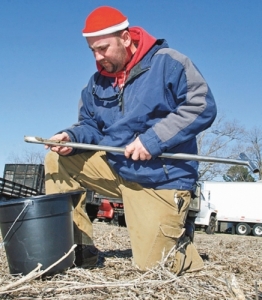County farmers not predicting banner year for planting, prices
By Catharin Shepard
Published in News on January 22, 2009 1:46 PM

News-Argus/BOBBY WILLIAMS
Keith Waller of Mount Olive takes a soil test on one of his fields. The test helps farmers determine the pH level of the soils and aid them in deciding what crops to plant and what fertilizers and pesticides to use. Waller says farmers are expecting another tough season this year. Last year, dry weather and high fuel prices were a double whammy for growers.
Even in the dead of winter, Keith Waller is thinking of spring.
Although the fields of his Mount Olive farm are empty this time of year, planting season is on the way, and Waller faces difficult decisions.
"We're trying to figure out what to plant, how much to plant," he said.
Waller is one of the many area farmers wrestling with expensive operational costs and wondering what 2009 will bring.
"It's scary in a way, because you don't know what the year's going to be like," he said. "But that's what we do. You can't just fold, you can't just quit."
Even without drought conditions, forecasters are saying 2009 will be a tough year for farmers.
"The outlook is not very good," said Kevin Johnson, agent with the Wayne County cooperative extension. "Crop prices are low, input prices are high. The forecast is not that optimistic."
The price of fertilizer has doubled in the past year due to the higher price of potash, which is most often imported from Canada and Russia. The potash and other components are responsible for the fluctuating fertilizer prices, Johnson said.
"One day it's high, and one day it's low," Waller said.
To make matters worse, many farmers rely on operating loans to finance the start of the growing season, but the economic downturn is affecting their ability to secure the money they need.
"There might be some cash flow problems," Johnson said. "Banks are not lending as easy as they used to."
Farmers are feeling some relief at the pump this year thanks to falling diesel prices, although the numbers have been slowly creeping upward again in January.
"It looks fairly good for the fuel, but it's volatile," Johnson said.
Farmers are exempt from paying the tax on diesel fuel used to run off-road vehicles like tractors and combines, but the sheer volume of fuel the machines require can quickly add up.
"Some of this equipment can burn 100 gallons a day," Johnson said.
Record-sized crops flooded the market in 2008, causing a price drop of about .50 per bushel across the board in the first few weeks of the new year.
Soybeans are at $9.70 a bushel, wheat is at $5.60 a bushel and corn is selling for $3.70 a bushel.
The cotton market looks grim, with prices down to about $.45 a bushel.
"Anything below $.65, there's no way you can make money on cotton," Johnson said. "Cotton is probably going to be down all year."
The crop might rebound in 2010, he said.
Last year's weather conditions hit one crop especially hard.
"The corn crop was horrible because of the drought," Johnson said.
The price of corn could go up this year to as much as $6 a bushel, due to supply and demand, he predicted.
Corn is used for livestock feed, but government initiatives pushing for development of the corn-based fuel ethanol are also buying large amounts of the crop.
"There's not but so much corn to go around," Johnson said.
Waller's 2008 corn crop didn't fare as badly in the drought as some did, he said. The Mount Olive area had slightly more rainfall at critical times than Goldsboro did, keeping the rain-loving corn alive, if not flourishing.
"We didn't suffer as much as other people," he said.
If corn prices go up, there is a good chance soybean prices will increase, too, Johnson said.
"That is an optimistic standpoint," he said.
A standpoint that Wayne County farmers seem to share, despite the shaky market.
"I feel pretty good about 2009," Waller said. "We're all optimistic, each of us. We all want to do good. It depends on the economy and Mother Nature."
